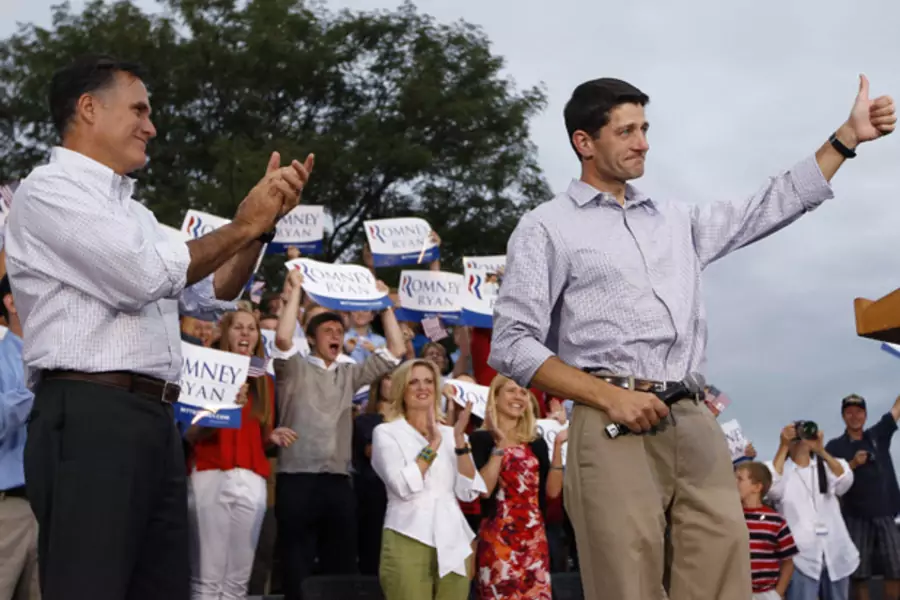Paul Ryan on Foreign Policy

More on:
The weekend’s big news is that Mitt Romney picked Paul Ryan, the chairman of the House Budget Committee, to be his running mate. Republicans are ecstatic over the choice. So are Democrats. One of the two is mistaken.
Ryan is beloved among conservative Republicans and Tea Party activists for proposing a budget plan that would drastically shrink the size and reach of the federal government. (The plan would not, however, rein in the federal debt, at least not any time soon. If enacted as proposed, it would not produce a balanced budget until about 2040. So another quarter century of red ink.) You can expect to be reading a lot about the pluses and minuses of Ryan’s domestic vision in the weeks to come.
But what about Ryan’s national security views? Here there is a lot less to go on. He hasn’t said or written nearly as much over the years about foreign policy, and he has never served on any defense or foreign affairs-related committee during his seven terms in the House. Indeed, his congressional web page doesn’t even list “foreign policy” as a choice for constituents looking to learn his views under “Issues in Depth.”
Based on the votes Ryan has cast, he is firmly in the Republican internationalist mainstream—touting American exceptionalism and the benefits of strong U.S. global leadership. A Ron Paul-style non-interventionist he is not.
As for whether Ryan would side with the neo-conservative wing of the GOP or traditional realists, well, you be the judge. He told the Alexander Hamilton Society last year:
A world without U.S. leadership will be a more chaotic place, a place where we have less influence, and a place where our citizens face more dangers and fewer opportunities. Take a moment and imagine a world led by China or by Russia…So we must lead. And a central element of maintaining American leadership is the promotion of our moral principles – consistently and energetically – without being unrealistic about what is possible for us to achieve…A safer world and a more prosperous America go hand-in-hand. Economic growth is the key to avoiding the kind of painful austerity that would limit our ability to generate both hard and soft power.
Neo-conservatives applaud the “so we must lead” line. Realists take comfort in the caveat that comes with it: not “being unrealistic about what is possible for us to achieve.” (For what it’s worth, the Romney campaign has assigned Dan Senor, who is a neoconservative, to be Ryan’s senior adviser.)
What does Ryan’s embrace of American exceptionalism mean in terms of specific policies? He would boost defense spending while slashing funding for diplomacy and foreign aid. He believes that “the engagement in Afghanistan is necessary” and warns that President Obama’s planned “withdrawal has the potential to pose security threats to soldiers continuing shorthanded counter-insurgency operations.” He favors a two-state solution for resolving the Israeli-Palestinian dispute while cautioning that “America should not pressure Israel to agree to a peace deal that is unlikely to result in peace and security.” He hasn’t had much to say about what the United States should do about Syria.
In a stance that potentially puts him at odds with Romney, Ryan has opposed legislation to punish China for manipulating its currency to promote its exports. He criticized President Obama’s failure to get congressional authorization for Operation Odyssey Dawn, but he voted against a bill to cut funds for U.S. military involvement in the NATO-led war in Libya. And he is skeptical that climate change poses a significant threat, having voted in 2011 against a motion that would have embraced the Environmental Protection Agency’s "scientific findings...that climate change is occurring, is caused largely by human activities, and poses significant risks for public health and welfare."
Of course, the fact that Ryan took these positions in the past does not guarantee that he will take similar ones in the future. After all, his votes for the Troubled Assets Relief Program, Medicare Part D, the GM bailout, and a variety of earmarks for his Wisconsin congressional district hardly predicted his emergence as the champion of small government.
One final observation. As a vice presidential nominee (and potential vice president), Ryan has the opportunity to press his foreign policy views on Romney, if he so desires. But the more important question is whom Romney is listening to on world affairs. And on that score the former Massachusetts governor remains a mystery.
More on:
 Online Store
Online Store